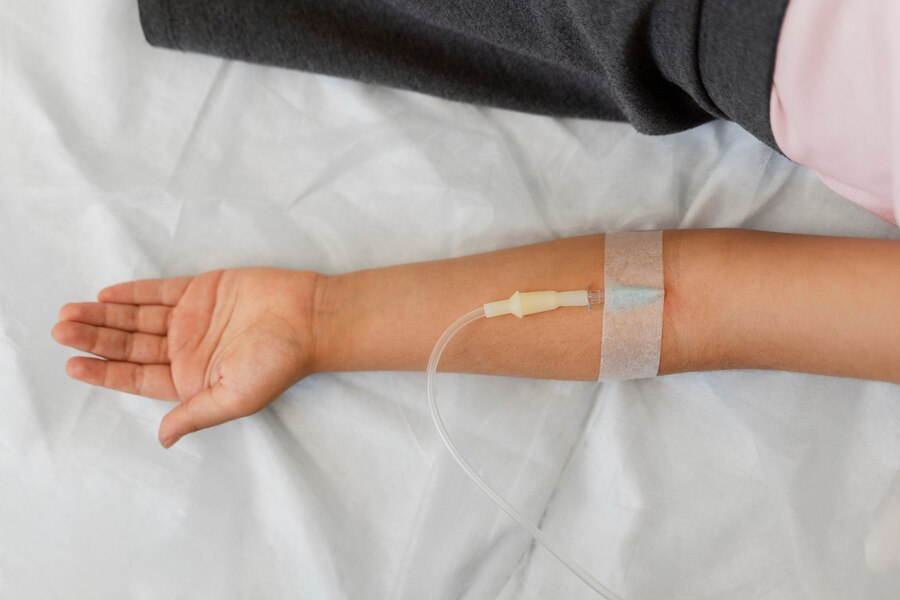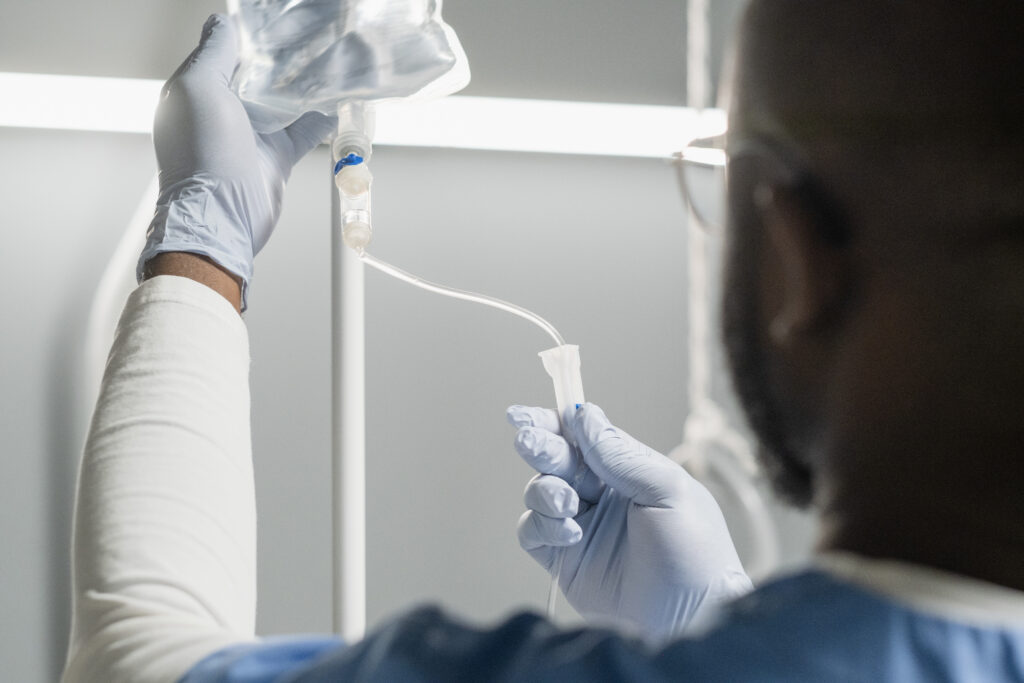In the realm of modern medicine, fluid therapy stands as a cornerstone in the treatment and management of various medical conditions. It encompasses a diverse array of techniques and solutions to restore and maintain proper fluid balance within the body. From intravenous drips to oral rehydration solutions, fluid therapy is pivotal in addressing dehydration, shock, and electrolyte imbalances, among other ailments.
However, the benefits of fluid therapy extend far beyond mere hydration. This article delves into the multifaceted world of fluid therapy, uncovering its importance, applications, and transformative impact on patient outcomes.
Fluid therapy is a fundamental intervention across diverse medical disciplines, spanning critical care, emergency medicine, surgery, and beyond. Whether administered in hospital settings or through at-home treatments, its primary objective remains consistent: to restore and maintain fluid balance within the body.
This entails replenishing lost fluids and ensuring the appropriate composition of electrolytes crucial for cellular function and overall physiological stability.
The versatility of fluid therapy is underscored by its ability to address a spectrum of medical conditions, ranging from routine cases of dehydration to life-threatening emergencies such as septic shock. Intravenous fluids, for instance, offer rapid rehydration and delivery of essential nutrients directly into the bloodstream, making them indispensable in acute care settings.
Conversely, oral rehydration solutions provide a practical and cost-effective means of restoring fluid balance, particularly in mild dehydration or gastrointestinal illnesses.
Importance of Fluid Balance
Fluid balance is essential for maintaining optimal bodily functions. Proper hydration ensures that cells receive necessary nutrients, helps regulate body temperature, supports organ function, and aids in waste removal. Imbalances, such as dehydration or fluid overload, can lead to serious health complications, emphasizing the critical role of fluid therapy in restoring and maintaining equilibrium.
Role In Critical Care
Fluid therapy is indispensable in critical care settings, where patients often face life-threatening conditions requiring immediate intervention. Whether managing trauma, sepsis, or other emergencies, fluid therapy helps stabilize patients, support vital organ function, and improve overall outcomes by addressing fluid deficits and maintaining hemodynamic stability.
Addressing Dehydration
Dehydration occurs when the body loses more fluids than it takes in, disrupting essential bodily functions. Fluid therapy offers a targeted approach to rehydrating patients, whether through oral rehydration solutions for mild cases or intravenous fluids for severe dehydration, preventing complications such as electrolyte imbalances and organ failure.
Managing Shock
Shock, characterized by inadequate tissue perfusion and oxygen delivery, requires swift intervention to prevent irreversible damage. Fluid resuscitation is a cornerstone of shock management, aiming to restore intravascular volume and improve cardiac output, thereby reversing the downward spiral of shock and mitigating organ dysfunction.
Electrolyte Imbalance Solutions
Electrolytes, such as sodium, potassium, and chloride, play crucial roles in nerve function, muscle contraction, and fluid balance. Fluid therapy formulations address electrolyte imbalances, ensuring proper cellular function and preventing complications such as cardiac arrhythmias and neurological disturbances.
- Oral Rehydration Solutions: These specially formulated solutions contain precise concentrations of electrolytes such as sodium, potassium, and chloride, designed to replenish fluids and electrolytes lost during conditions like diarrhea, vomiting, or intense physical activity, restoring electrolyte balance.
- Intravenous Electrolyte Replacement: In cases of severe electrolyte imbalances or compromised oral intake, intravenous electrolyte solutions are administered directly into the bloodstream. This allows for rapid correction of electrolyte imbalances, especially in critical care settings where immediate intervention is crucial.
- Dietary Modifications: Certain dietary adjustments can help address electrolyte imbalances over the long term. For example, increasing potassium-rich foods like bananas and spinach can help correct low potassium levels while reducing sodium intake can assist in managing hypertension and fluid retention.
- Medication Management: In some cases, medications may contribute to electrolyte imbalances. Healthcare providers may adjust medication dosages or prescribe alternative treatments to mitigate these effects and restore electrolyte balance, ensuring optimal patient safety and well-being.
Versatility Across Disciplines
Fluid therapy transcends medical specialties, finding applications in critical care, surgery, pediatrics, and beyond. Its adaptability allows healthcare providers to tailor treatments to specific patient needs, whether in acute care settings or long-term management of chronic conditions, highlighting its versatility and widespread utility.
- Critical Care: Fluid therapy is crucial in critical care settings, where it stabilizes patients, supports vital organ function, and improves outcomes. Whether managing trauma, sepsis, or post-operative recovery, fluid therapy plays a pivotal role in maintaining hemodynamic stability and optimizing patient care, reducing morbidity and mortality rates.
- Surgery: Fluid therapy is integral to perioperative care, ensuring patients remain hydrated and stable throughout surgical procedures. Intravenous fluids help maintain intravascular volume and support organ perfusion, reducing the risk of complications such as hypotension, electrolyte imbalances, and post-operative complications like ileus or delayed recovery.
- Pediatrics: Fluid therapy is tailored to the unique needs of pediatric patients, accounting for factors such as age, weight, and developmental stage. Whether addressing dehydration due to gastroenteritis or managing fluid shifts in neonates, pediatric fluid therapy aims to maintain hydration, support growth, and promote optimal health outcomes in children.
- Emergency Medicine: In emergency settings, fluid therapy is employed to stabilize patients presenting with a wide range of acute conditions. From managing hypovolemic shock due to trauma to addressing electrolyte imbalances in diabetic emergencies, fluid therapy serves as a cornerstone intervention, providing rapid resuscitation and stabilization to critically ill patients.
- Chronic Disease Management: Fluid therapy plays a role in managing chronic conditions such as heart failure, kidney disease, and certain gastrointestinal disorders. Tailored fluid regimens help mitigate symptoms, prevent exacerbations, and optimize patient well-being, illustrating the adaptability of fluid therapy across diverse medical specialties and patient populations.
Intravenous Fluids: Rapid Rehydration
Intravenous fluids deliver fluids and electrolytes directly into the bloodstream, bypassing the gastrointestinal tract for rapid absorption. This method is crucial for rapidly rehydrating patients in critical conditions, such as those with severe dehydration, bleeding, or septic shock, where immediate intervention is paramount.
Oral Rehydration Solutions
Oral rehydration solutions offer a simple and effective means of replenishing fluids and electrolytes lost through vomiting, diarrhea, or excessive sweating. These solutions are precious in resource-limited settings or mild cases of dehydration, providing an affordable and accessible treatment option.
Cost-Effective Treatments
Fluid therapy, whether through intravenous or oral routes, is generally cost-effective compared to other medical interventions. Preventing complications, reducing hospital stays, and improving patient outcomes represents an efficient use of healthcare resources, making it a cornerstone of modern medical practice.
Enhancing Patient Recovery
Proper fluid management supports patient recovery by optimizing tissue perfusion, facilitating organ function, and promoting overall physiological stability. By addressing fluid deficits and restoring electrolyte balance, fluid therapy minimizes the risk of complications and expedites the healing process, enabling patients to regain their health more effectively
Optimizing Tissue Perfusion
Adequate tissue perfusion is essential for delivering oxygen and nutrients to cells and removing metabolic waste products. Fluid therapy is vital in optimizing perfusion by maintaining intravascular volume and cardiac output, ensuring tissues receive the necessary oxygen and nutrients to support cellular function and promote healing.
Individualized Treatment Approaches
Recognizing that patients have unique fluid requirements based on their medical conditions, comorbidities, and physiological status, fluid therapy is tailored to individual needs. Healthcare providers assess fluid balance, electrolyte levels, and hemodynamic parameters to develop personalized treatment plans that optimize outcomes and minimize risks.
Mitigating Complications
While fluid therapy is essential for maintaining homeostasis, inappropriate administration can lead to complications such as fluid overload, electrolyte imbalances, or pulmonary edema. Careful monitoring, judicious use of fluids, and adherence to evidence-based guidelines help mitigate these risks and ensure the safe and effective delivery of therapy.
- Proper Monitoring: Continuous monitoring of fluid intake, output, and electrolyte levels allows healthcare providers to detect early signs of complications such as fluid overload or electrolyte imbalances. Timely interventions based on these assessments help mitigate risks and ensure safe and effective fluid therapy management.
- Individualized Treatment Plans: Tailoring fluid therapy regimens to each patient’s specific needs and clinical status minimizes the risk of complications. By considering factors such as age, weight, comorbidities, and fluid balance, healthcare providers optimize fluid therapy to achieve therapeutic goals while mitigating adverse effects.
- Adherence to Evidence-Based Guidelines: Following established guidelines and protocols for fluid therapy administration reduces the likelihood of complications. Evidence-based practices, informed by clinical research and expert consensus, guide healthcare providers in selecting appropriate fluids, dosages, and monitoring strategies, promoting patient safety and optimal outcomes.

Precision Medicine Principles
Fluid therapy aligns with the principles of precision medicine, which emphasizes personalized approaches tailored to individual patient characteristics. By integrating patient data, clinical expertise, and evolving research, healthcare providers optimize fluid therapy interventions to achieve the best outcomes for each patient, reflecting a commitment to precision and excellence in care.
Future Advancements in Fluid Therapy
Ongoing research and technological innovations continue to shape the future of fluid therapy. From developing novel fluid formulations to advances in monitoring techniques and predictive analytics, the field is poised for further refinement and optimization. Future advancements promise to enhance fluid therapy’s efficacy, safety, and precision, ushering in new possibilities for improved patient care and outcomes.
As we conclude our exploration into the vast domain of fluid therapy, it becomes evident that this indispensable intervention is not merely about replenishing fluids but about restoring balance, enhancing patient outcomes, and shaping the future of healthcare. From critical care to routine treatments, fluid therapy plays a pivotal role in maintaining physiological stability, optimizing recovery, and improving the overall quality of life for patients around the globe.
As we embark on this journey towards optimizing fluid therapy and embracing holistic wellness, consider partnering with Lotus Healthcare and Aesthetics. Our mission is to revolutionize the traditional approach to health and beauty, providing a sanctuary where advanced medical expertise and rejuvenating aesthetics converge to promote holistic wellness.
Contact us at Lotushealthcare01@gmail.com or call us at (850) 252-6161 to learn more about our innovative approaches to healthcare and how we can work together to prioritize your well-being. Let’s embark on this journey towards better health and beauty, hand in hand, with a commitment to excellence and personalized care.



